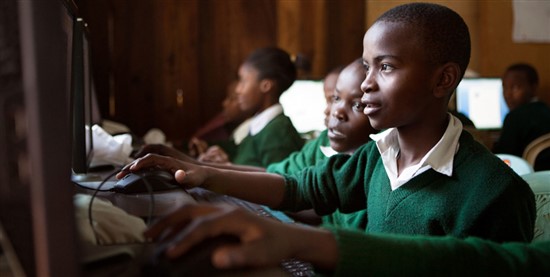By Heather Wilson
Jolene, an 11-year-old Moshi, Tanzanian student, sits at a refurbished computer and explains in a video interview how this computer will help her realize her dream of becoming a pilot.
Planes fly over her home – a rural community at the foot of Mount Kilimanjaro. The closest city is four hours away. With a computer, Jolene saidshe can connect with those pilots and ask questions about how to operate a plane. With the computer classes she is taking, she will gain valuable experience that can help her get into university later.
Jolene’s computer is playing a very important role in its second life – and refurbished computers like hers go to underserved schools in Africa through unique reuse partnerships, including the oneled by Dell Asset Resale and Recycling services.
Dell takes back decommissioned computer electronics from thousands of business customers worldwide. Through its partnership in the Netherlands with its customer Rabobank, Dell is taking its recycling service one step further and giving discarded corporate technologies a new life in African schools, hospitals and small businesses through its donation program.
This extended service is something Dell will do for any customer as part of its Dell Asset Resale and Recycling services. The customer may choose to donate their retired PCs to a registered charity or non-profit organization of their choice. Rabobank chose Close the Gap.
Close the Gap is an international non-profit that aims to bridge the digital divide by offering high-quality, pre-owned computers donated by companies internationally to educational, medical and social projects in developing and emerging countries. Through its voluntary e-Resource Certificate Programdonors can support the responsible recycling of a similar asset in a developing country and in doing so, bring new opportunities into these communities by creating green jobs, stimulating local economies and recovering precious material that can be used in new IT equipment.
Close the Gap shares Jolene’s story and others through its Let’s Talk Trashinteractive web documentary and shows how underserved people are benefiting from reused information and communication technology (ICT) equipment and e-waste in sub-Saharan Africa.
Here’s how the process works:
- When Rabobank upgrades its Dell systems, it determines which of its older PCs and other electronics are ready for donation. Dell Asset Resale and Recycling Services takes back these items and prepares them for donation, safely and securely wiping the systems’ data so a new lifecycle can begin.
- Once they’re ready, systems are then shipped to Burundi, Kenya, Rwanda, Tanzania and Uganda, where Close the Gap selects local donation recipients. They work with local partners to install, maintain and train users on these “renewed” systems for educational, medical and social projects in developing countries.
- When each donated system reaches its end-of-life, Dell’s local environmental partner collects this extinguished asset and ensures the equipment is recycled responsibly.
- Additionally, Dell participates in Close the Gap’s e-waste offsetting program so that for every PC that Rabobank donates to be installed in Africa, another one is recycled.
Secondary school students in Uganda complete a class project using re-used, donated equipment from Dell customer Rabobank.
This unique coordination of partners and expertise is an example of Dell’s commitment to global electronics recycling and giving people access to ICT to improve their educational and economic prospect.
“We call it the double lifecycle,” said Marianne de Roos, a customer executive for Dell Services. “We combined Dell’s Managed Services with the Asset Resale and Recycling services and Close the Gap to package this as one solution. It’s a turnkey way for Rabobank to minimize its environmental impact and bolster its positive social impact.”
Rabobank has donated 13,142 decommissioned desktops, laptops and monitors since its partnership with Dell began in 2012, and in 2015, the company extended its contract with Dell for another three years.
“These donated electronics can equip more than 400 new computer labs with capacity for over 100,000 students,” said Deborah Sanders, director of Dell Global Takeback. “This partnership is a great example of Dell’s corporate social responsibility aligning to business outcomes. We’re working with our customers to enable them to serve communities across the globe, effectively narrowing the digital divide.”
To maximize the lifetime use of Dell products, Sanders noted Dell would like to work with more customers and non-profit organizations – in the way it works with Rabobank and Close the Gap – so that more Dell Asset Resale and Recycling customers have the option to donate their decommissioned electronics to developing countries.
E-waste is one of the fastest-growing waste streams globally. According to the StEP Initiative/United Nations University, the world’s population will discard 75 million tons of electrical and electronic equipment (EEE) in 2015, up from 65.1 million tons in 2012.
Dell is committed to the recovery and proper recycling of electronics and offers safe, convenient takeback programs for consumers in 78 countries and territories, accepting electrical and electronic equipment of all brands.
In FY15, Dell launched its closed-loop recycling, which incorporates the plastics from electronics recovered through our takeback services into the plastics used to make new Dell products. With the launch of the OptiPlex™ 3030 All-in-One in 2014, Dell became the first in the industry to offer a desktop made with recycled plastics that are third-party certified (by UL Environment) as closed-loop.
To learn more about the company’s goal to recover 2 billion pounds of used electronics by 2020, visit www.dell.com/legacyofgoodupdate.
